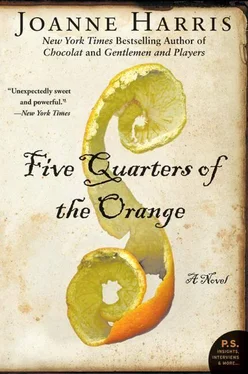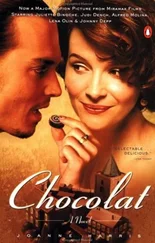Silence. Cassis gave a sudden pleading look at Reine. I began to stare him out. He held my gaze for a second or two, then turned away.
“Baby stuff,” he said with mock indifference.
“ Double dare you.”
Cassis made a furious gesture of helplessness and defeat. “Oh, all right, but I tell you, it’s going to be a pointless waste of time-”
I laughed in triumph.
The Café de la Mauvaise Réputation, “ La Rép ” to its regulars-wooden floor, polished bar with an old piano standing beside it (of course, nowadays half the keys are missing and there’s a planter of geraniums where the works used to be), a row of bottles (no optics in those days) and glasses hanging on hooks under the bar and around. The sign has been replaced by a blue neon thing and there are machines and a jukebox, but in those days there was nothing but the piano and a few tables that you could move against the walls if anyone happened to want to dance.
Raphaël could play when he wanted to, and sometimes someone-one of the women, Colette Gaudin or Agnès Petit-might sing. No one had a record player in those days, and the radio was forbidden, but the café was said to be a lively place in the evenings, and we sometimes heard music from there even across the fields if the wind was blowing in the right direction. That was where Julien Lecoz lost his south pasture at cards-rumor had it he’d betted his wife as well, but no one would take him up on the offer-and it was the second home of the local drunks who would sit at the terrasse smoking or playing pétanque by the steps. Paul’s father was there often, much to our mother’s disapproval, and though I never saw him drunk he never seemed to be quite sober either, smiling vaguely at passersby and showing his big square yellow dentures. It was a place where we never went. We were territorial creatures and regarded certain places as peculiarly our own, though others belonged to the village, the adults, places of mystery or indifference, the church, the post office where Michelle Hourias sorted the mail and gossiped over the counter, the little school where we had spent our earliest years, but which now stayed boarded up.
La Mauvaise Réputation.
We stayed away partly because our mother told us. She had a peculiar hatred of drunkenness, of dirt, of loose living, and the place epitomized all of these to her. Though she was not a churchgoer she retained an almost puritanical view of life, believing in hard work, a clean house, polite, well-mannered children. When she had to walk past the place she would do so with her head lowered protectively, a scarf crossed at her thin chest, mouth pursed against the sounds of music and laughter from within. Strange that such a woman-such a self-controlled, order-loving woman-should have fallen victim to drug addiction.
Like the clock , she writes in her album, I am divided. When the moon rises I am not myself . She went to her room so that we would not see her change.
It was a shock to me to realize, after reading those secret passages in the album, that she went regularly to La Mauvaise Réputation. Once a week or more she went there, after dark and in secret, hating every moment and hating herself for her need. She did not drink-no. Why should she, when there were dozens of bottles of cider or prunelle or even calva from her native Brittany in the cellar? Drunkenness, she told us once in a rare moment of confidence, is a sin against the fruit, the tree, the wine itself. It is an outrage, an abuse, just as rape is an abuse of the act of love. She flushed then, turning away gruffly- Reine-Claude, the oil and some basil, quickly! -but the thought stayed with me. Wine, distilled and nurtured from bud into fruit and then through all the processes that make it what it is, deserves better than to be guzzled by some sot with a headful of nonsense. It deserves reverence. Joy. Gentleness.
Oh, she understood wine, my mother. She understood the sweetening process, the fermentation, the seething and mellowing of life in the bottle, the darkening, the slow transformations, the birth of a new vintage in a bouquet of aromas like a magician’s bunch of paper flowers. If only she had had time and patience enough for us. A child is not a fruit tree. She understood that too late. There is no recipe to take a child into sweet, safe adulthood. She should have known that.
Of course, drugs are still sold in La Mauvaise Réputation. Even I know that, and I’m not so old that I can’t recognize the sweet jazzy reek of pot over the haze of beer and frying. God knows I smelled it often enough across the road from the Snack-Wagon-I’ve got a nose, even if that idiot Ramondin hasn’t-and the air was yellow with it some nights when the bikers came. “Recreational drugs,” they call them nowadays, and give them fancy names. But there wasn’t really any such thing in Les Laveuses in those days. The jazz clubs of St Germain-des-Prés were still a decade away, and besides, they never really reached us, not even in the sixties. No, my mother went to La Mauvaise Réputation out of need, simple need, because that was where most of the trading took place. Black market trading, cloth and shoes and less innocuous things like knives, guns, ammunition… Everything had its place at La Rép, cigarettes and brandy and picture postcards of naked women, nylon stockings and lace underwear for Colette and Agnès, who wore their hair loose and reddened their cheekbones with old-fashioned rouge so that they looked like Dutch dolls, one high crimson spot on each cheek and a round bud on the lips, like Lillian Gish.
Round the back, the secret societies, the Communists, the malcontents, the would-bes and the heroes made plans. In the bar the talkers held court and passed little packages to one another or whispered in undertones and drank to future undertakings. In the woods a few wore soot on their faces and cycled to meetings in Angers, braving the curfew. Sometimes-very infrequently-you could hear shots from the other side of the river.
How Mother must have hated it.
But that was where she got the pills. She wrote it all in her album-pills for migraine, morphine from the hospital, three at a time first and then six, ten, twelve, twenty. Her suppliers varied. At first it was Philippe Hourias. Julien Lecoz knew someone, a voluntary worker. Agnès Petit had a cousin, a friend of a friend in Paris…Guilherm Ramondin, the one with the wooden leg, could be persuaded to exchange some of his own medication for wine or money. Small packages, a couple of tablets in a twist of paper, an ampoule and a syringe, a blister of pills. Anything with a morphine base. Of course there was no getting anything from the doctor. In any case, the nearest was in Angers, and all the supplies were needed to treat our soldiers. After her own supplies ran out she scrounged, sold, swapped. She kept the list in her album.
March 2, 1942. Guilherm Ramondin. 4 tablets morphine against 12 eggs.
March 16, 1942. Françoise Petit. 3 tablets morphine against bottle Calvados.
She sold her jewelry-the single row of pearls she is wearing in the wedding photo, her rings, the diamond-chip earrings she had from her mother-in Angers. She was ingenious. Almost as much as Tomas, in her way, though she was always fair in her dealings. With a little ingenuity, she managed.
Then the Germans came.
One or two at a time at first. Some in uniform, some out. The bar fell silent at their entrance, but they made up for that by their merriment, their laughter, the rounds they drank, standing up unsteady at closing time with a smile to Colette or Agnès and a careless handful of coins thrown onto the counter. Sometimes they brought women. We never recognized them, the fur-collared girls from town, girls with nylon stockings and sheer dresses and hair rolled into movie-star confections bristling with hairpins and plucked-thin eyebrows and red-black gleaming lips with white teeth and drooping long-fingered hands over wineglasses. They only came at night. Only with the Germans on the backs of their motorcycles, squealing with shrill delight as they sped through the night, hair flying. Four women. Four Germans. Every now and again the women changed, but the Germans stayed the same.
Читать дальше












